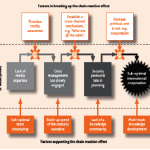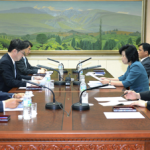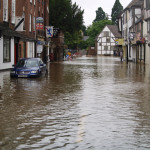- DETERRENCE: @tomic 2012: an exercise in perspective
- DPRK: Zone of engagement: can North Korea’s Kaesong complex be internationalized?
- ENERGY SECURITY: Parliament takes first step to fix carbon market
- GOVERNANCE AND CIVIL SOCIETY: Japan’s PM Abe’s mandate is much smaller than it looks
- CLIMATE CHANGE ADAPTATION: The climate adaptation frontier
- AUSTRAL PEACE AND SECURITY: Pine Gap drives US drone kills
 DETERRENCE: @tomic 2012: an exercise in perspective, National Coordinator for Security and Counterterrorism (June 2013) [PDF, 0.2MB]
DETERRENCE: @tomic 2012: an exercise in perspective, National Coordinator for Security and Counterterrorism (June 2013) [PDF, 0.2MB]
16 country teams envisioned a radiological/nuclear terrorist attack with a cyberattack at tabletop exercise. Response was reactive, not proactive. Lessons learned included the need to break out of established habits of sharing, but the global nature of such threats requires breaking free of these patterns.
- Smugglers turn to air transport to evade maritime WMD policing, Rachel Oswald, Global Security Newswire (11 July 2013)
- The nuclear security summit: progress report, M. Cann et al, Arms Control Association and Partnership for Global Security (July 2013) [PDF, 3.4MB]
 DPRK: Zone of engagement: can North Korea’s Kaesong complex be internationalized? Troy Stangarone, Global Asia (June 2013)
DPRK: Zone of engagement: can North Korea’s Kaesong complex be internationalized? Troy Stangarone, Global Asia (June 2013)
North Korea continues its outreach. They continue to deal with South Korea in Kaesong and soccer. North Korea appears to have stopped work on a launch site. Kim Song-nam, who made arrangements for Kim Jong-il visits to China, made a low key visit to Beijing and Qinghai province. These signs may indicate North Korea is trying to set a peaceful stage for a Kim Jong-un visit to China in fall 2013.
- Images show NKorea launch-pad halt, Foster Klug, Associated Press / ABC News (23 July 2013)
- Sohae satellite launching station (Tongchang-ri) 3D panoramas, 38 North (22 July 2013)
- North Korea extends an olive branch; intends to visit China this fall, Ta Kung Pao (11 July 2013) [Chinese language]
 ENERGY SECURITY: Parliament takes first step to fix carbon market, Euractiv.com (4 July 2013)
ENERGY SECURITY: Parliament takes first step to fix carbon market, Euractiv.com (4 July 2013)
Like nuclear power, which started in the US but has limited future there now, confined to a few states, the originally American idea of “cap and trade” regimes for a multi-lateral regime of greenhouse gas controls has faded away and is now limited to some states there while tinkering goes on in Europe, China, and Down Under in Australia and New Zealand. Low prices need fixing, high prices need fixing; a “market-based” system increasingly looks like children’s sandbox in need of adult supervision. Will children be persuaded to play something else?
- Australia to switch from carbon tax to emissions trading scheme, AFP, South China Morning Post (15 July 2013)
- Carbon politics down under: Kevin Rudd dumps his predecessor’s tax, Wall Street Journal (18 July 2013)
- Climate of change: US-China accords would show way to global deal, Financial Times (14 July 2013) [Subscription required]
 GOVERNANCE AND CIVIL SOCIETY: Japan’s PM Abe’s mandate is much smaller than it looks, Reuters (22 July 2013)
GOVERNANCE AND CIVIL SOCIETY: Japan’s PM Abe’s mandate is much smaller than it looks, Reuters (22 July 2013)
Japan PM Abe’s ruling LDP party election victory is an apparent show of public support for his “Abenomics” policies, but some analysts argue that with only 52 percent voter turnout, his mandate is not so strong in reality. Abe is stressing his economic agenda, but regional neighbors are more concerned over his nationalism and push to revise Japan’s constitution. Public opinion in Japan and Korea show a weariness of China’s military buildup as well.
- Japan’s Abe vows to keep focus on economy after big election win, Linda Sieg, Reuters (22 July 2013)
- Japan’s elections rattle China, Bruce Einhorn, Bloomberg Businessweek (22 July 2013)
- Most Koreans, Japanese worry about China’s military buildup, Chosun Ilbo (20 July 2013)
 CLIMATE CHANGE ADAPTATION: The climate adaptation frontier, Benjamin L. Preston, Kirstin Dow, and Frans Berkhout, Sustainability, vol. 5, no. 3 (2013) [PDF,1MB]
CLIMATE CHANGE ADAPTATION: The climate adaptation frontier, Benjamin L. Preston, Kirstin Dow, and Frans Berkhout, Sustainability, vol. 5, no. 3 (2013) [PDF,1MB]
The adaptation frontier is a space where both risk and opportunity coexist, with human agency acting as the arbitrator of outcomes. In fact, the frontier is in itself a product of human design, with societal choices regarding greenhouse gas emissions, socioeconomic trajectories and social values interacting to both threaten the sustainability of socio-ecological systems, as well as crafting adaptive solutions to maintain a safe operating space.
- Are there social limits to adaptation to climate change? W. Neil Adger et al., Climatic Change, vol. 93 (2009) [PDF, 3.7MB]
- Climate change 2007: Lifting the taboo on adaptation, Roger Pielke, Jr et al., Nature, vol. 445 (2007)
 AUSTRAL PEACE AND SECURITY: Pine Gap drives US drone kills, Philip Dorling, The Age (21 July 2013)
AUSTRAL PEACE AND SECURITY: Pine Gap drives US drone kills, Philip Dorling, The Age (21 July 2013)
New evidence confirms the growth of the US-led worldwide internet and signals intelligence network, with global integration of intelligence collection and production. The nominally US-Australian joint intelligence facility at Pine Gap in Central Australia, long vital in US nuclear warfighting plans, now has a key role not only in operations in Afghanistan but also in ongoing drone strikes throughout the Middle East and North Africa.
- Australian outback station at forefront of US spying arsenal, Philip Dorling, Sydney Morning Herald (21 July 2013)
- Snowden reveals Australia’s links to US spy web, Philip Dorling, The Age (8 July 2013)
- The “Joint Facilities” revisited – Desmond Ball, democratic debate on security, and the human interest, Special Report, Nautilus Institute for Security and Sustainability (12 December 2012) [PDF, 2MB]
The Nautilus Peace and Security Weekly Report presents articles and full length reports each week in six categories: Austral security, nuclear deterrence, energy security, climate change and security, the DPRK, climate change adaptation and governance and civil society. Our team of contributors carefully select items that highlight the links between these themes and the three regions in which our offices are found—North America, Northeast Asia, and the Austral-Asia region.
Subscribe to NAPSNet to receive free weekly email reports
Editor
Contributors
- Deterrence: Peter Hayes
- Governance and Civil Society: Dyana Mardon
- Climate Change Adaptation: Saleem Janjua
- DPRK: Roger Cavazos
- Energy Security: Nikhil Desai
- Austral Peace and Security: Richard Tanter

